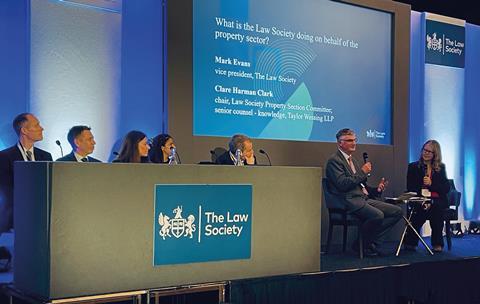Helping conveyancers understand the ramifications of climate risk was among the topics discussed at the Law Society’s Property Conference. The divisive TA6 information form came up too

The agenda for the Law Society’s annual Property Conference on Wednesday once again highlighted the complex landscape solicitors must navigate, with topics ranging from business lease renewals and green leases, to government legislation on building safety, to leasehold and freehold reforms.
However, the event began with a topic solicitors will increasingly have to grapple with: climate risk.
After publishing guidance to help solicitors understand the wide-ranging effects of climate change, and its potential impact on their organisation and legal advice, the Law Society is consulting on a new practice note to support conveyancing solicitors with their professional duties and best practice. (The consultation closes on 31 October.)
‘We do not want to turn you into environmental lawyers,’ said Warren Gordon, a senior professional support lawyer in the real estate team at CMS Cameron McKenna Nabarro Olswang. ‘We want to give you a better and practical understanding of the topic in so far as it is relevant to your property transactions, realising you’re not environmental specialists.’
A Society practice note on flood risk explores current and historical issues, Gordon said, but climate risk is about the future and clients will want to know whether climate change will have a drastic impact on their use of the property.
'We’re not climate experts. Clients should not expect us to be so, but we have a professional duty to advise on climate risk and any avenues they can explore'
Amy Allen, Norton Rose Fulbright
When advising clients, Amy Allen, a knowledge lawyer in the real estate team at Norton Rose Fulbright, said solicitors should explain the potential risk to a client at the outset of a transaction. Solicitors should agree with the client what they will and will not be doing in relation to climate risk. If acting for a lender, does the lender have specific requirements? Clients should be informed on the availability of climate searches.
If a client is looking to make an investment, how long they are looking to hold that investment is important, noted Meena Kamath, head of built environment at The Chancery Lane Project. ‘The longer they hold it, the greater the climate risk will affect them.’
Allen added that solicitors should take care to record instructions on these matters. ‘If the client decides against ordering a climate search, put that down in writing. We’re not climate experts. Clients should not expect us to be so, but we have a professional duty to advise on climate risk and any avenues they can explore.’
A poll conducted during the panel session showed that 91% of attendees currently order an environmental search or separate climate search that forecasts climate risk.
Elsewhere, the Society’s new TA6 property information form was the subject of a popular breakout session.
After postponing compulsory use of the form, which was updated to support National Trading Standards guidance on ‘material information’ for property listings, Chancery Lane is currently consulting with members on issues relating to the form and to identify improvements.
The form has divided opinion but Sarah Sargent, head of residential property at Lupton Fawcett, said her firm began using the new TA6 when it came out. She believes a lot of people who have raised objections to the form have yet to use it.
‘Have we experienced any problems? No,’ she said. ‘Clients are filling them in, they’re not having any difficulties. When I’m receiving forms back, they’re completed. We have got to remember this is a form that clients are completing. They are allowed to get things wrong. They are allowed to not know what radon gas is. They are allowed to say there are no covenants affecting the property but we find out later there are.’
Another advantage, the conference heard, is that solicitors can iron out issues earlier in the process. If the client has noted on the form that they have had a new extension or driveway done but do not have the relevant certificates, options such as indemnity insurance can be explored. ‘When we get that contract pack, we’re not just sending problems to the other side, we’re sending some solutions,’ Sargent said.
The final panel session saw panellists ‘horizon scanning’. One important event to look out for, noted Dominic Curran, assistant director at the British Property Federation, is this month’s budget. Changes to capital gains tax and stamp duty land tax could be on the chancellor’s agenda.
Whether the budget will further complicate the property landscape remains to be seen. But, as Society vice president and property law specialist Mark Evans told the conference at the start of the day, governments often change tax law, rules and regulations, and property lawyers are the first to adapt. Often, their efforts go unnoticed and unappreciated. Not on Evans’ watch.
This article is now closed for comment.




































11 Readers' comments